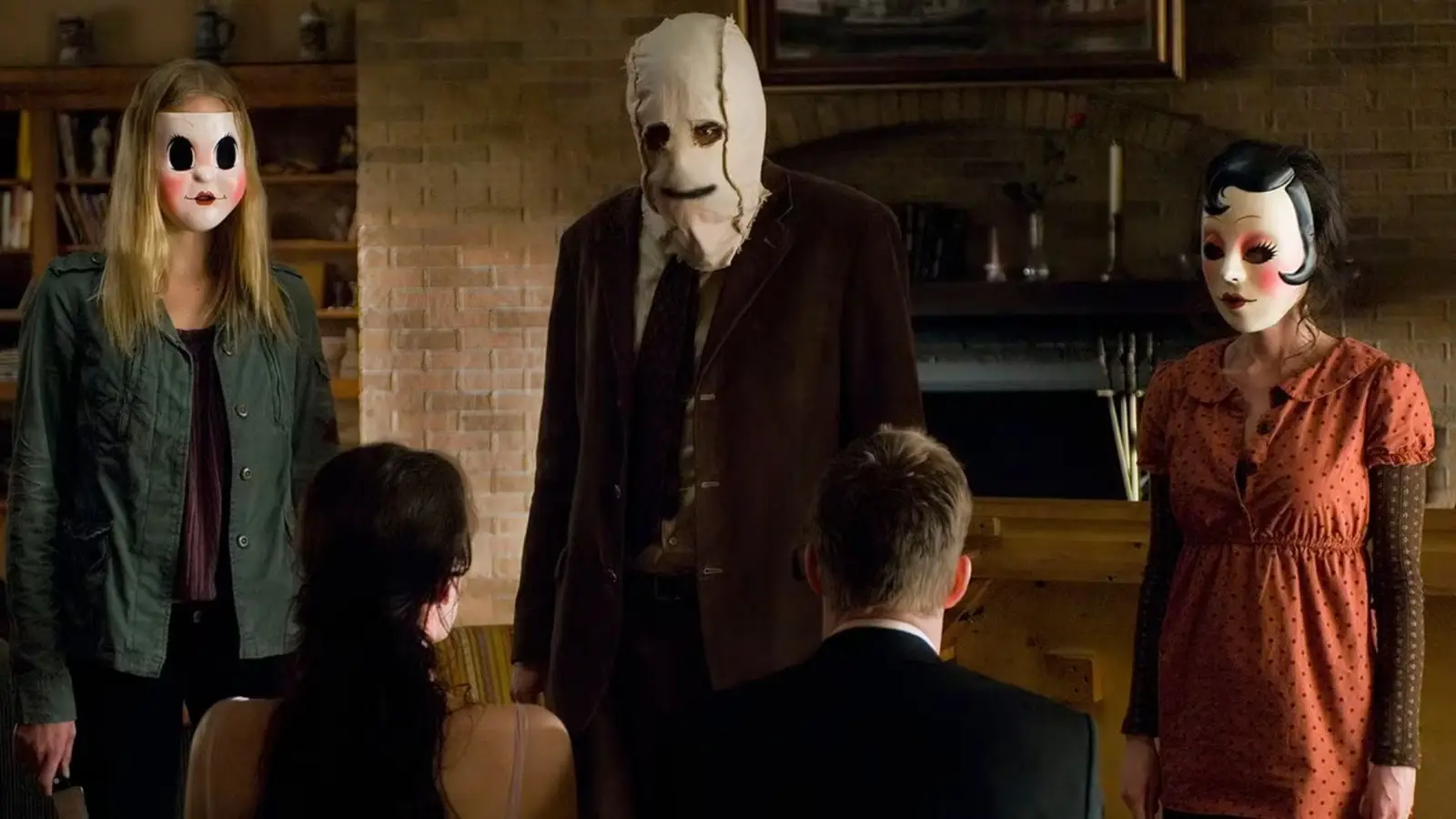Copyright Screen Rant

Some of the most effective quotes in horror movie history have been seemingly forgotten compared to some of the more memorable entrants. Some horror movie quotes are so iconic they echo through pop culture: “Here’s Johnny!” or “They’re here!” Yet the genre is also filled with subtler, chilling lines that get buried beneath their film’s blood and chaos. These lesser-known quotes often reveal deeper meanings about the characters. They highlight their pain, or the movie’s broader themes. From satanic temptation to generational trauma and nihilistic evil, these overlooked lines prove that horror’s greatest power often lies not in screams, but in words. “Sin Never Dies.” – Margaret White, Carrie (1976) After the blood-soaked climax of Carrie, the title character returns home desperate for comfort. Drenched in shame and despair, Sissy Spacek's horror icon Carrie turns to her mother, Margaret White, a religious zealot who greets her not with compassion. Instead, she suggests they pray and utters the ominous words: “Sin never dies.” The line comes moments before Margaret attacks her daughter in an attempt to “save” her soul, leading to Carrie’s final act of revenge. This brief exchange, delivered in the shadow of tragedy, perfectly captures Carrie’s central theme of repression and inherited trauma. Margaret’s words are both prophecy and curse. Margaret’s line implies that sin, guilt, and punishment are cyclical – passed from mother to daughter. Though often eclipsed by Margaret’s better-known tirades, “Sin never dies” lingers as a quiet horror – the reminder that pain, once sown, perpetuates itself. It also foreshadows the surprise final scare when Carrie seemingly returns from the dead. “Kill Her, Mommy!” – Pamela Voorhees, Friday The 13th (1980) Before Jason Voorhees became a slasher icon, his mother Pamela was the one wielding the machete in Friday the 13th. When her identity as the killer is revealed, she recalls her son’s drowning and the voice that urges her on: “Kill her, Mommy!” It’s a deeply unsettling moment, watching a grieving mother act out her son’s vengeance through madness. The scene is equal parts horror and heartbreak. Pamela’s voice shifts from tender to deranged as she converses with her son’s imagined ghost. It reframes the entire film, turning what seemed like a faceless killer spree into the story of a woman broken by neglect and grief. Many often forget that Friday the 13th began as a mother’s tragedy, not Jason’s carnage. Betsy Palmer’s performance and this quote especially deserve more credit. Palmer transformed vengeance into something disturbingly maternal and set up the mother-son themes that became essential to the franchise. “No Tears Please, It’s A Waste Of Good Suffering.” – Pinhead, Hellraiser (1987) When Kirsty Cotton summons the Cenobites to a hospital in Hellraiser, she finds herself pleading for mercy. Pinhead, the leader of the demonic beings, responds coolly: “No tears please, it’s a waste of good suffering.” It’s a line that encapsulates the sadistic elegance of Clive Barker’s nightmarish world. This moment highlights the paradox of Hellraiser: its monsters are both torturers and philosophers. Pinhead isn’t merely threatening Kirsty; he’s relishing the art of agony. The line’s rhythm and diction (polite yet perverse) reflect a being who views pain as performance. While “We’ll tear your soul apart” gets all the attention, this earlier quote might be even more sinister. It’s poetic, darkly humorous, and delivered with such calm that it transforms cruelty into ceremony. Pinhead’s eloquence throughout Hellraiser makes his evil unforgettable. “Boy, The Next Word That Comes Out Of Your Mouth Better Be Some Brilliant F**Kin’ Mark Twain Sh*T. ‘Cause It’s Definitely Getting Chiseled On Your Tombstone.” – Otis, The Devil’s Rejects (2005) In Rob Zombie’s brutal The Devil’s Rejects, Otis Firefly stands out as the most terrifyingly articulate of the killers. During the motel hostage scene, one victim dares to speak up. Otis’s chillingly replies: “Boy, the next word that comes out of your mouth better be some brilliant f**kin’ Mark Twain sh*t, ‘cause it’s definitely getting chiseled on your tombstone.” Delivered with calm precision, Otis’s line fuses sadism with poetry. It’s not shouted, it’s whispered like scripture. The contrast between his crude humor and literary reference gives the moment a surreal sophistication. It’s a window into how Otis romanticizes his own cruelty throughout The Devil’s Rejects. This Devil’s Rejects quote tends to be overshadowed by the film’s violence. However, it’s one of Zombie’s sharpest pieces of writing. It shows that true horror doesn’t always need screaming; sometimes it’s the stillness before the act that’s most terrifying. “Wouldst Thou Like To Live Deliciously?” – Black Phillip, The Witch (2015) At the end of Robert Eggers’ The Witch, Thomasin has lost her family and her faith. Suddenly, the family’s goat, Black Phillip, speaks: “Wouldst thou like to live deliciously?” The line is both an offer and a temptation: a whispered promise from the Devil himself. The scene unfolds in haunting quiet. The voice, deep and seductive, invites Thomasin to abandon her suffering and embrace power. The phrase “live deliciously” becomes an intoxicating metaphor for freedom, pleasure, and self-determination in a puritanical world. Few lines in modern horror carry such layered meaning. It’s not just about a pact with evil; it’s about liberation from repression. Yet, it’s often reduced to meme status. In truth, it’s the moment in The Witch when Thomasin’s tragedy transforms into triumph, sin into agency. “You Forgot The First Rule Of Remakes, Jill... Don’t F**k With The Original.” – Sidney, Scre4m (2011) In Scre4m, the fourth entry of the meta-horror franchise, Sidney Prescott once again faces a new Ghostface killer. This time, it’s her fame-hungry cousin, Jill. When Jill boasts about reinventing the story for a new generation, Sidney shoots her, snarling, “You forgot the first rule of remakes, Jill... don’t f**k with the original.” The scene perfectly mirrors the Scream franchise’s self-awareness. It’s not just Sidney fighting back, it’s Wes Craven himself, pushing back against Hollywood’s obsession with reboots. The line lands with cathartic finality, fusing meta-commentary with genuine badassery. While Scre4m didn’t earn the same acclaim as earlier entries, this quote is pure horror gold. It cements Sidney as one of the most self-aware and enduring final girls in cinema. She’ll forever be defiant, funny, and unkillable, regardless of the movie’s quality. “Because You Were Home.” – The Strangers, The Strangers (2008) In The Strangers, three masked villains enter a couple’s home and begin ruthlessly attacking the couple. During the horror movie’s dark climax and after hours of torment, the terrified couple finally ask their masked attackers why they’re being targeted. The answer is chillingly simple: “Because you were home.” That’s it – no motive, no revenge, no reason. The entire scene hinges on this minimalist cruelty. By stripping away logic, The Strangers taps into a primal fear: random, senseless violence. It’s horror born not from monsters, but from human indifference. This quote stands as one of the scariest in modern horror precisely because it’s so mundane and simplistic. Evil doesn’t need justification, sometimes it just knocks on the door. Yet, despite its brilliance, it’s rarely mentioned among the greats, which only makes it more haunting. “You Were Not Content With The Stories, So I Was Obliged To Come.” – Candyman, Candyman (1992) Candyman offered a modern folk tale inspired by urban legends. When Helen Lyle first encounters Candyman in a dim parking garage, he emerges from the shadows and says, “You were not content with the stories, so I was obliged to come.” His voice echoes, warm yet commanding, as he steps into the light, revealing his face. The quote neatly captures the essence of urban legends; how curiosity and disbelief give myths new life. Candyman’s arrival isn’t vengeance; it’s fulfillment. Helen’s skepticism summoned him, blurring the line between storyteller and story. Moreover, it highlights the character’s unsettling seductive quality. Tony Todd’s Candyman is as alluring as he if horrifying. Though overshadowed by the film’s hook-handed imagery and haunting score, this line is among the most elegant in horror. It’s seductive and mournful, painting Candyman as a tragic deity of belief, created by human need for fear and folklore. “He’s A Very Queer Looking Old Gentleman, Sir.” – Minnie, The Bride Of Frankenstein (1935) When Doctor Pretorius arrives at Frankenstein’s castle in The Bride of Frankenstein, the eccentric maid Minnie remarks, “He’s a very queer looking old gentleman, sir.” It’s a moment played for humor. However, it carries deeper meaning beneath the surface. Directed by openly gay filmmaker James Whale, The Bride of Frankenstein was loaded with LGBTQ+ subtext at a time when it couldn’t be openly stated. Pretorius’s camp, theatrical manner and his bond with Frankenstein make Minnie’s line an intentional wink to audiences who understood. In hindsight, this small quote feels revolutionary. It’s a sly acknowledgment of queerness in a 1930s horror film, hidden in plain sight. Now that the term “queer” has been reclaimed by the LGBTQ+ community, this reference has become even more explicit. What was once coded has since become celebrated, transforming an overlooked moment into a cornerstone of LGBTQ+ horror history. “I Do Know That For The Sympathy Of One Living Being, I Would Make Peace With All. I Have Love In Me The Likes Of Which You Can Scarcely Imagine And Rage The Likes Of Which You Would Not Believe. If I Cannot Satisfy The One, I Will Indulge The Other." – The Monster, Frankenstein (1994) In Kenneth Branagh’s Frankenstein, the creature confronts his creator, begging for a companion. When Victor refuses, the Monster warns: “I have love in me the likes of which you can scarcely imagine and rage the likes of which you would not believe. If I cannot satisfy the one, I will indulge the other.” Drawn directly from Mary Shelley’s novel, this speech humanizes the Monster completely. It’s not just a threat: it’s a plea born of loneliness, self-awareness, and pain. His eloquence contrasts sharply with Victor’s arrogance, revealing who the true “monster” really is. Though overshadowed by classic one-liners from older Frankenstein films, this quote is profoundly beautiful. It reminds audiences that horror can be deeply emotional; that the most terrifying thing isn’t monstrosity, but the loss of empathy. In one of the biggest horror movie themes, this line helps reveal that the Monster is misunderstood and pushed into villainy by society. It’s a stunning horror movie line loaded with repercussions.



